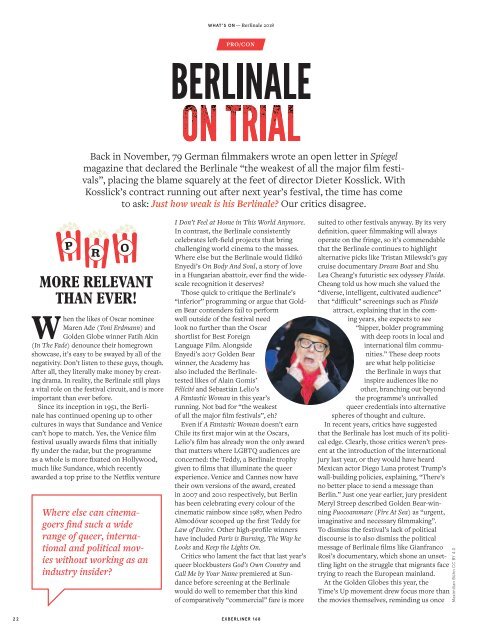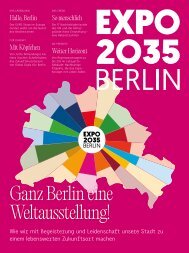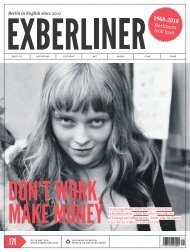EXBERLINER Issue 168, February 2018
Create successful ePaper yourself
Turn your PDF publications into a flip-book with our unique Google optimized e-Paper software.
WHAT’S ON — Berlinale <strong>2018</strong><br />
PRO/CON<br />
Back in November, 79 German filmmakers wrote an open letter in Spiegel<br />
magazine that declared the Berlinale “the weakest of all the major film festivals”,<br />
placing the blame squarely at the feet of director Dieter Kosslick. With<br />
Kosslick’s contract running out after next year’s festival, the time has come<br />
to ask: Just how weak is his Berlinale? Our critics disagree.<br />
P<br />
R<br />
O<br />
MORE RELEVANT<br />
THAN EVER!<br />
When the likes of Oscar nominee<br />
Maren Ade (Toni Erdmann) and<br />
Golden Globe winner Fatih Akin<br />
(In The Fade) denounce their homegrown<br />
showcase, it’s easy to be swayed by all of the<br />
negativity. Don’t listen to these guys, though.<br />
After all, they literally make money by creating<br />
drama. In reality, the Berlinale still plays<br />
a vital role on the festival circuit, and is more<br />
important than ever before.<br />
Since its inception in 1951, the Berlinale<br />
has continued opening up to other<br />
cultures in ways that Sundance and Venice<br />
can’t hope to match. Yes, the Venice film<br />
festival usually awards films that initially<br />
fly under the radar, but the programme<br />
as a whole is more fixated on Hollywood,<br />
much like Sundance, which recently<br />
awarded a top prize to the Netflix venture<br />
Where else can cinemagoers<br />
find such a wide<br />
range of queer, international<br />
and political movies<br />
without working as an<br />
industry insider?<br />
I Don’t Feel at Home in This World Anymore.<br />
In contrast, the Berlinale consistently<br />
celebrates left-field projects that bring<br />
challenging world cinema to the masses.<br />
Where else but the Berlinale would Ildikó<br />
Enyedi’s On Body And Soul, a story of love<br />
in a Hungarian abattoir, ever find the widescale<br />
recognition it deserves?<br />
Those quick to critique the Berlinale’s<br />
“inferior” programming or argue that Golden<br />
Bear contenders fail to perform<br />
well outside of the festival need<br />
look no further than the Oscar<br />
shortlist for Best Foreign<br />
Language Film. Alongside<br />
Enyedi’s 2017 Golden Bear<br />
winner, the Academy has<br />
also included the Berlinaletested<br />
likes of Alain Gomis’<br />
Félicité and Sebastián Lelio’s<br />
A Fantastic Woman in this year’s<br />
running. Not bad for “the weakest<br />
of all the major film festivals”, eh?<br />
Even if A Fantastic Woman doesn’t earn<br />
Chile its first major win at the Oscars,<br />
Lelio’s film has already won the only award<br />
that matters where LGBTQ audiences are<br />
concerned: the Teddy, a Berlinale trophy<br />
given to films that illuminate the queer<br />
experience. Venice and Cannes now have<br />
their own versions of the award, created<br />
in 2007 and 2010 respectively, but Berlin<br />
has been celebrating every colour of the<br />
cinematic rainbow since 1987, when Pedro<br />
Almodóvar scooped up the first Teddy for<br />
Law of Desire. Other high-profile winners<br />
have included Paris is Burning, The Way he<br />
Looks and Keep the Lights On.<br />
Critics who lament the fact that last year’s<br />
queer blockbusters God’s Own Country and<br />
Call Me by Your Name premiered at Sundance<br />
before screening at the Berlinale<br />
would do well to remember that this kind<br />
of comparatively “commercial” fare is more<br />
suited to other festivals anyway. By its very<br />
definition, queer filmmaking will always<br />
operate on the fringe, so it’s commendable<br />
that the Berlinale continues to highlight<br />
alternative picks like Tristan Milewski’s gay<br />
cruise documentary Dream Boat and Shu<br />
Lea Cheang’s futuristic sex odyssey Fluidø.<br />
Cheang told us how much she valued the<br />
“diverse, intelligent, cultivated audience”<br />
that “difficult” screenings such as Fluidø<br />
attract, explaining that in the coming<br />
years, she expects to see<br />
“hipper, bolder programming<br />
with deep roots in local and<br />
international film communities.”<br />
These deep roots<br />
are what help politicise<br />
the Berlinale in ways that<br />
inspire audiences like no<br />
other, branching out beyond<br />
the programme’s unrivalled<br />
queer credentials into alternative<br />
spheres of thought and culture.<br />
In recent years, critics have suggested<br />
that the Berlinale has lost much of its political<br />
edge. Clearly, those critics weren’t present<br />
at the introduction of the international<br />
jury last year, or they would have heard<br />
Mexican actor Diego Luna protest Trump’s<br />
wall-building policies, explaining, “There’s<br />
no better place to send a message than<br />
Berlin.” Just one year earlier, jury president<br />
Meryl Streep described Golden Bear-winning<br />
Fuocoammare (Fire At Sea) as “urgent,<br />
imaginative and necessary filmmaking”.<br />
To dismiss the festival’s lack of political<br />
discourse is to also dismiss the political<br />
message of Berlinale films like Gianfranco<br />
Rosi’s documentary, which shone an unsettling<br />
light on the struggle that migrants face<br />
trying to reach the European mainland.<br />
At the Golden Globes this year, the<br />
Time’s Up movement drew focus more than<br />
the movies themselves, reminding us once<br />
Maximilian Bühn CC BY 4.0<br />
22<br />
<strong>EXBERLINER</strong> <strong>168</strong>

















